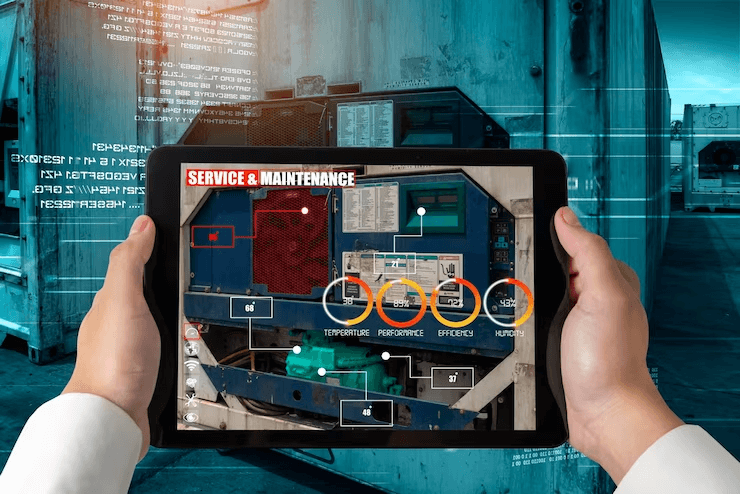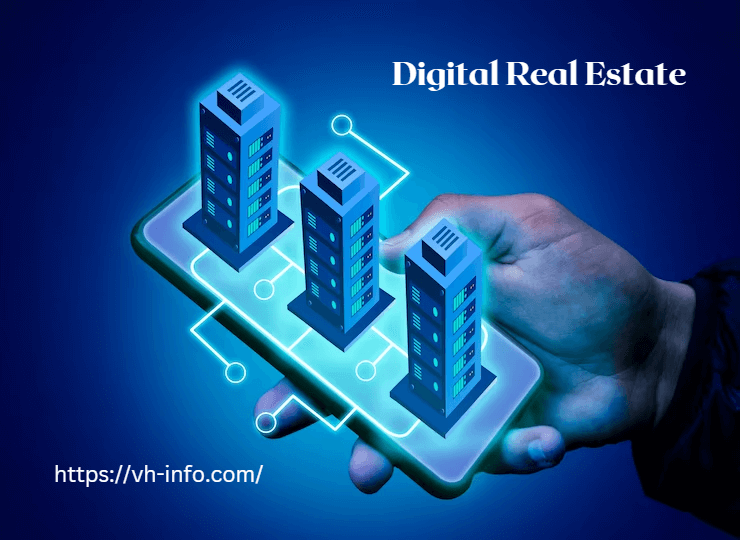Introduction of Digital Real Estate
The real estate industry is undergoing a digital transformation, with advancements in technology reshaping the way properties are bought, sold, and managed. The future of digital real estate promises exciting features and benefits that will revolutionize the industry, providing enhanced experiences for buyers, sellers, and real estate professionals a like.
In this article, we will explore the various features and corresponding benefits that are shaping the future of digital real estate. From virtual reality and augmented reality experiences to blockchain-enabled transactions, artificial intelligence, and big data analytics, these advancements are set to redefine how we interact with real estate. By leveraging technology, the industry is moving towards a more efficient, transparent, and personalized ecosystem that will greatly benefit all stakeholders involved.
Read More:Top Digital Marketing Trends in 2023
1. VR & AR Experience: Virtual Reality and Augmented Reality

Feature: Virtual reality and augmented reality, as part of advanced real estate technology, enable immersive property experiences, allowing users to explore properties remotely and visualize them in different contexts. Many modern platforms now offer 3D virtual property tours that simulate in-person walkthroughs, complete with interactive floor plans, room measurements, and guided navigation features
Benefits:
- Enhanced property exploration: Buyers can virtually tour properties from anywhere, eliminating the need for physical visits and saving time and resources. For example, those searching for homes for sale in Lane County can explore multiple listings remotely, gaining a comprehensive view of potential properties before scheduling in-person visits.
- Improved decision-making: VR and AR experiences provide a realistic sense of space and allow global buyers to visualize the potential of a property, helping them make more informed decisions.
- Increased accessibility: Virtual tours open up opportunities for international or remote buyers, enabling them to view properties without geographical constraints.
2. Blockchain-enabled Transactions:

Feature: Blockchain technology facilitates secure, transparent, and efficient property transactions by eliminating intermediaries and providing tamper-proof records of ownership.
Benefits:
- Enhanced security and trust: Blockchain ensures the integrity of property records, reducing the risk of fraud and disputes.
- Streamlined processes: Smart contracts automate and expedite transaction processes, reducing paperwork and time-consuming administrative tasks.
- Increased transparency: Blockchain provides a transparent record of property ownership and transaction history, fostering trust between parties involved.
3. Artificial Intelligence (AI) Personalization:

Feature: AI-powered algorithms analyze data to deliver personalized property recommendations and assist buyers in their search. Similar to how travelers explore Fareharbor alternatives when booking activities, property seekers are now guided by AI to find homes that fit their unique preferences and needs.
Benefits:
- Tailored property suggestions: AI algorithms consider buyer preferences, behavior, and historical data to present properties that closely match their requirements.
- Improved user experience: AI-driven chatbots provide instant responses to inquiries, offering a seamless and personalized customer service experience. For this you can use ChatGPT Integration Services.
- Time-saving: AI filters and algorithms narrow down property options, saving buyers from sifting through irrelevant listings and streamlining the search process. The use of AI in real estate can significantly enhance the property search and transaction experience for both buyers and sellers. AI-powered algorithms analyze a wealth of data to deliver personalized recommendations and provide valuable insights to assist decision-making.
4. Big Data Analytics:

Feature: Advanced analytics leverage big data to provide valuable insights into market trends, pricing, and investment opportunities.
Benefits:
- Informed decision-making: Analyzing vast amounts of data allows buyers and sellers to make data-driven decisions, minimizing risks and maximizing returns, streamlining the job of virtual real estate assistants.
- Accurate pricing models: Big data analytics enable more precise property valuations, considering factors such as market dynamics, comparable sales, and local trends.
- Market predictions: Analyzing historical data and market indicators helps anticipate future trends and identify emerging real estate opportunities.
5. Internet of Things (IoT) Integration:

Feature: IoT integration in properties enables smart home automation and remote property management.
Benefits:
- Enhanced convenience and efficiency: IoT devices automate tasks such as lighting, security, and temperature control, offering a seamless and convenient living experience. For example, just like a GPS Hund allows pet owners to monitor their pets remotely, IoT-enabled sensors let homeowners track and manage their property systems from anywhere, reducing operational costs and improving efficiency.
- Energy efficiency: IoT-enabled sensors optimize resource usage, reducing utility costs and promoting sustainability.
- Remote property management: IoT devices enable remote monitoring and management of properties, facilitating maintenance and reducing operational costs.
6. Enhanced Data Visualization:

Feature: Advanced data visualization tools present complex real estate data in user-friendly and visually appealing formats.
Benefits:
- Improved analysis: Data visualization techniques, such as charts, graphs, and maps, make it easier to comprehend and interpret complex real estate data, facilitating better decision-making.
- Enhanced market understanding: Visualizing market trends, property valuations, and investment opportunities enables buyers and sellers to gain a comprehensive understanding of the real estate landscape.
- Effective communication: Visual representations of data simplify the communication of real estate insights to clients and stakeholders, fostering clearer and more engaging discussions.
7. Drone Technology:

Feature: Drones equipped with cameras are used to capture aerial footage and provide a unique perspective on properties.
Benefits:
- Enhanced property marketing: Aerial imagery and real estate videos captured by drones offer stunning visual presentations of properties, showcasing their surroundings and highlighting unique features.
- Remote property assessment: Drones can access hard-to-reach areas, allowing inspectors and appraisers to assess the condition of roofs, facades, and other structural elements remotely.
- Time and cost savings: Drones eliminate the need for expensive helicopter or crane rentals for aerial photography, making it a cost-effective solution for property marketing. Similarly, the use of drones in the telecom industry streamlines the inspection and maintenance of telecom infrastructure, enabling rapid assessments and reducing operational costs.
8. Chatbots and Virtual Assistants:

Feature: AI-powered chatbots and virtual assistants provide instant customer support and information to users.
Benefits:
- 24/7 customer service: Chatbots can handle inquiries, provide property information, and answer frequently asked questions at any time, improving customer satisfaction and responsiveness. An AI chatbot with voice capabilities can further enhance the experience by offering more personalized, conversational support. Though it’s also important to note that chatbots should not be the only form of customer care option available for your customers, since in emergency a human is able to assist in the best manner so you can opt for a answering service for property management companies to make sure you have a team of experts available to take up most complaints.
- Time-saving: Chatbots streamline the initial stages of the buying process by quickly providing property details, availability, and scheduling options, saving buyers’ time and effort.
- Scalability: Chatbots can handle multiple customer interactions simultaneously, ensuring that all inquiries are addressed promptly and efficiently.
9. Sustainable and Energy-Efficient Solutions:

Feature: Digital real estate is embracing sustainable and energy-efficient technologies to reduce environmental impact and lower operating costs.
Benefits:
- Lower utility costs: Properties equipped with energy-efficient features, such as solar panels, smart lighting, and HVAC systems, result in reduced energy consumption and cost savings. Utilizing HVAC business software can further enhance efficiency by optimizing system performance and maintenance.
- Environmental sustainability: Sustainable solutions, like rainwater harvesting systems or green roofs, contribute to a greener environment and enhance the overall value of properties.
- Market demand and value: Buyers are increasingly prioritizing eco-friendly properties, and embracing sustainable practices can attract a larger pool of environmentally conscious buyers.
10. Real-time Data and Market Updates:

Feature: Digital platforms provide real-time data on property listings, market trends, and pricing information.
Benefits:
- Market transparency: Buyers and sellers have access to up-to-date information on property availability, recent sales, and market dynamics, empowering them to make informed decisions.
- Pricing accuracy: Real-time data enables more accurate property valuations, reducing the likelihood of overpricing or underpricing.
- Market competitiveness: Buyers can stay informed about market trends and pricing fluctuations, allowing them to act quickly in competitive markets.
11. Virtual Staging and Interior Design:

Feature: Virtual staging and interior design tools use computer-generated imagery (CGI) to showcase properties with virtual furniture and decor.
Benefits:
- Cost-effective property presentation: Virtual staging eliminates the need to physically stage a property, saving sellers time and money while still showcasing its potential.
- Personalization and visualization: Virtual staging allows buyers to envision the property’s potential by customizing and visualizing different interior design concepts, furniture arrangements, and color schemes. In a dynamic market like Dubai, a real estate company in Dubai can use virtual staging to attract international clients by presenting properties in a visually appealing manner.
12. Data-driven Predictive Maintenance:

Feature: Data analytics and sensors are used to predict maintenance needs and proactively address property issues.
Benefits:
- Improved property maintenance: By analyzing data from sensors and historical maintenance records, property owners can identify potential issues and address them before they become major problems, ensuring the longevity and value of the property.
- Cost savings: Predictive maintenance helps avoid expensive emergency repairs like the need to repair flat roof by addressing maintenance needs proactively, reducing repair costs and minimizing disruptions for tenants or homeowners.
- Enhanced property value: Regular and timely maintenance improves the overall condition and appeal of the property, increasing its value and attracting potential buyers or tenants.
13. Intelligent Property Search and Recommendation Systems:

Benefits:
- Enhanced user experience: Intelligent property search systems consider buyer preferences, budget, location, and other criteria to deliver tailored recommendations, saving buyers time and effort in finding suitable properties.
- Discovery of hidden gems: Recommendation systems can uncover hidden or off-market properties that may align with the buyer’s preferences, expanding their options and increasing the chances of finding their ideal property.
- Data-driven decision-making: By leveraging historical data and user feedback, these systems provide valuable insights into market trends, helping buyers make informed decisions about their property investments.
Feature: Intelligent algorithms such as Fox LMS and machine learning techniques power advanced property search and recommendation systems, providing personalized suggestions to buyers.
Conclusion of Digital Real Estate:
Future of digital real estate holds immense promise with its wide array of features and benefits. From virtual reality and augmented reality experiences to blockchain-enabled transactions, artificial intelligence, and big data analytics, these advancements are reshaping the industry, creating a more efficient, transparent, and personalized ecosystem.
The integration of technology into real estate brings numerous advantages. It allows buyers to explore properties remotely, saving time and effort. Blockchain-based transactions ensure security and transparency, while artificial intelligence and big data analytics provide valuable insights for informed decision-making.
As the digital revolution continues to unfold, the future of digital real estate holds immense potential to transform the industry, creating a more connected, accessible, and optimized experience for all stakeholders involved. Embracing these features and benefits will undoubtedly shape the way we buy, sell, and manage real estate, opening up new possibilities and opportunities in the years to come.
After exploring the transformative features of digital real estate, engaging with knowledgeable local professionals can further enhance the buying or selling experience. In regions like real estate agents who are well-versed in these digital tools can offer invaluable guidance, ensuring clients make informed decisions backed by the latest technology.
Hitesh Sanandiya
Hitesh Sanandiya is a Co-founder & CEO at vh-info. He loves to talk about link building, seo & digital marketing strategies. In his free time, He likes to read & stay updated on the latest digital marketing trends!
You can always reach out to Hitesh on Linkedin.



